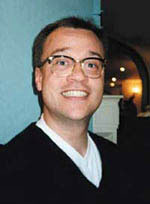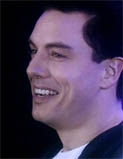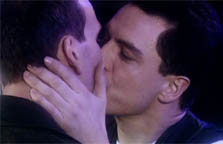May 22, 2006
A column tackling gay issues, gay themes, and just general gayness in television.
Out-takesNo Sex, Please, We're Gallifreyan
Who's Afraid of the big Bad Wolf?
 Russell T. Davies: Bringing homosexuality and Welsh-ness to the general sci-fi populace |
Before I begin, however, I need a disclaimer or two. One, for those of us in the New World: As I am writing this column, I know that I have seen much more of the recent series than has the average American, and as such, I'll hold off on spoilers as much as I can. Hell, the reason this column kept getting delayed is that my beautiful and talented editor responded to my enthusiasm for writing a column about Captain Jack with a resounding, "...Who's Captain Jack?" Oh, right, I said, and kept myself occupied in the interim. [For the Americans: We have now seen SOME of Captain Jack. But certainly one of the images used here could be considered a spoiler. A very hot spoiler. But a spoiler, nonetheless. -Liz]
And two, for our friends on the other side of the pond: I also know that I have seen far less of the earlier Who than has your average Brit, and can therefore be termed accurately as a Doctor-come-lately — someone who likes my science fiction postmodern, ironic, and queer like football bats, and who had next to no idea walking into the series what Doctor Who 'should' be like. I call this like a neophyte, and am not entirely ashamed.
| But back to Cardiff. No, wait, I'm an American (a Texan, to be more specific), and have no real emotional investment in the Welsh. Back to the gay. |
In retrospect, you can't say the BBC didn't know what they were getting themselves into. Before coming to breathe new life into the old TARDIS, Russell T. Davies, the aforementioned gay Welshman, produced and wrote for Queer as Folk (the original British version), a show unsubtle from the get-go about its homosexual agenda. While Doctor Who is hardly Queer, it certainly comes ready-made with potential queer elements: time travel, alien cultures, a main character who regenerates with new faces and personalities, and room for pretty much anything else a decent science fiction writer can justify. In fact, I would have been sorely disappointed had Mr. T. Davies not risen to the occasion.
His choice of response, however, is interesting — he didn't go for the Doctor. No, as I have been given to understand by a friend of mine (she and the Doctor go way further back than I do), to say that the show's time-traveling alien protagonist has historically been portrayed as nonsexual is a bit of an understatement. He's got his companions, and the occasional fellow Time Lord (Time Lady?) for company, but these encounters result in no epic romances, no tawdry affairs, no jolly rolls in the hay (at least, not as acknowledged onscreen). The Doctor, it seems, does not have time enough for love1.
 I mean, yeah. He is really really adorably gay. |
For his own part, the Ninth Doctor seems to be perfectly aware that the humans around him expect him to behave like a sexual being, without feeling any real need to live up to their expectations. His relationship with Rose remains a bit tense, as she has an obvious crush on him to the point where teasing her about it and/or leading her on would just be cruel. However, Jack's effusive, overt sexuality gives the Doctor a chance to respond to sexual situations without forcing him to respond in the affirmative — a safe date, as it were. In 'Boom Town,' when the threesome have found their way to Cardiff (again), Rose reunites with her boyfriend, Mickey, and Jack and the Doctor are left watching on the sidelines:
Jack: "Aww, sweet. Look at these two. How come I never get any of that?"
Doctor: "Buy me a drink first."
Jack: "Such hard work."
Doctor: "But worth it."
| There are only two men, one indiscriminate, the other celibate, who love each other tremendously regardless of what either would do with the other in bed. |
Which, I suppose, is another thing that happens when you put your television in the hands of a gay Welshman — you get queer characters treated quite respectably. Aside from Rose's brief 21st century human girl shock that the guy who had danced with her on top of the invisible spaceship is also sleeping with the gentleman guarding the camp gate, whom Jack is interested in is never nearly so much the joke as that he's constantly interested. His sexual preference is just yes and now Ñ to be contrasted with the Doctor's no and never, and Rose's normal and I have a boyfriend and he's adorable. Jack shows interest in going out and getting laid so no one else has to! Behold, postmodern science fiction attitudes that can still sneak past the old guard without causing too much of an uproar. You know I love it.
 |
Short and sweet, I can't wait for Torchwood, Captain Jack's very own spin-off, and I think I trust Russell T. Davies to make it more than just the Captain Jack Is Gay Show. He is, after all, a really neat character, and I'm dying to find out more about his backstory and personality beyond his sexual orientation(s). ...But, hey, if we find out these things while he makes out with men — and women — and aliens — and robots — so much the better.
NEXT TIME, ON OUT-TAKES: Scrubbing Straightly; or, J.D. and Turk Go To White Castle.
1No, this is not a footnote to apologize for the Heinlein reference. This is a footnote to say that though I have not read any of them, apparently the slightly-non-but-maybe-actually-canonical novels apparently seem to suggest that Gallifreyans reproduce mechanically, through a genetic loom that does not require actual sexual intercourse. While these novels are not, in fact, necessarily considered authoritative in the Doctor Who-verse, when the guys who wrote them are now the ones creating the new show, you know there's bound to be some continuity carryover.
Email the author.
Return to Season 2, Episode 17.
All written content © 2005-2006 by the authors. For more information, contact homer@smrt-tv.com
